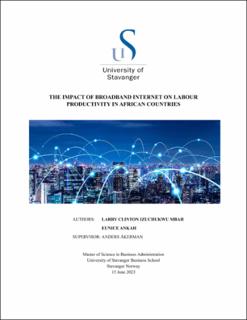| dc.description.abstract | This study investigates the impact of broadband Internet on labour productivity in Africa, focusing on 34 countries. The research is estimated using a quantitative approach, by utilizing a fixed-effect panel regression model to analyze panel data obtained from the World Bank Indicator, from the period 2005 to 2020. The fixed-effect approach controls for country-specific heterogeneity and time-invariant unobserved factors, to produce more reliable estimates and enhance the robustness of the findings.
The findings show compelling evidence of a positive and significant effect of broadband Internet on labour productivity in African countries. The result suggests a 0.11 percent increase in the logarithm of labour productivity for each percent increase in broadband across the countries. Broadband Internet accessibility enhances workers’ access to information and increases knowledge acquisition, improves workers’ collaboration and cohesiveness notwithstanding geographical barriers, and stimulates e-commerce opportunities.
The findings of this study emphasize the significance of promoting broadband connectivity as an agent of economic growth, and for continued investment in broadband Internet infrastructure in Africa. Institutions, policymakers and stakeholders should prioritize strategies aimed at expanding broadband accessibility and affordability, to further harness the gains in labour productivity. | |
